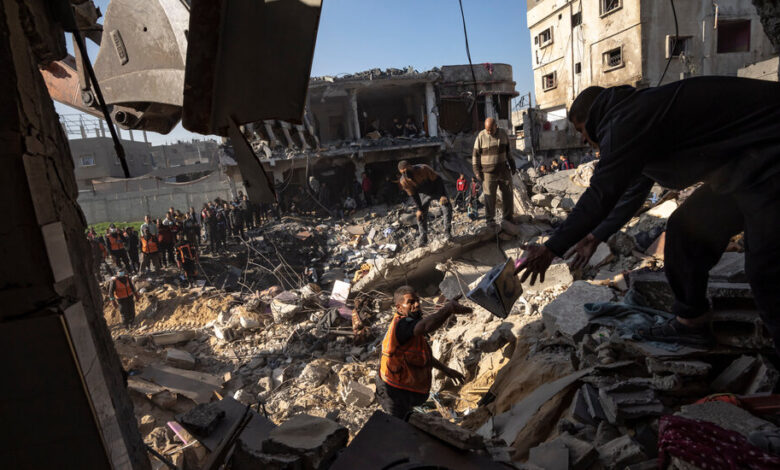
[ad_1]
For the second day in a row, the United Nations Security Council delayed a vote on a resolution calling for Israel and Hamas to provide greater access for more humanitarian aid, and pauses in the fighting to make that possible, as diplomats wrestled with the United States on what it might allow to pass.
The announcement of a delay followed hours of intense, closed-door negotiations and a Security Council session in which diplomats discussed the war in Gaza. It also followed days of negotiations since Friday when the United Arab Emirates, which put forth the resolution, circulated the text among members.
Many of the discussions focused on the necessity for the council to act as dire conditions worsen for more than two million Palestinian civilians in Gaza. Tor Wennesland, the U.N. special coordinator for the Middle East peace process, on Tuesday told the council there was “the human catastrophe on the ground.”
The draft resolution that was set for a vote would have called for suspending the fighting to allow the safe delivery of humanitarian relief to Gaza via land, air and sea and the immediate release of hostages held in Gaza. It also called for the establishment of a way for the United Nations to monitor the aid deliveries.
The United States has been the only member of the Security Council to block demands for an immediate and permanent cease-fire, vetoing two such resolutions. At the General Assembly, the United States was among 10 countries that voted against a measure last week when an overwhelming majority of 153 countries voted in favor of a cease-fire.
Pressure has been building on the Biden administration, internationally and domestically, to do more to help Palestinian civilians and to help end the war. A New York Times/Siena College poll published on Tuesday found 57 percent of Americans disapprove of the Biden administration’s handling of the war.
The negotiations before the latest vote focused on finding a middle ground that would have a meaningful impact in Gaza, diplomats said.
On a visit last week to the Rafah border crossing between Gaza and Egypt, heads of U.N. humanitarian agencies and local aid agencies in both places told Council members that alleviating the suffering of the estimated 2.2 million Palestinians in Gaza would be impossible without significantly more aid, the opening of more routes into the enclave and a halt to fighting.
The United Arab Emirates, the only Arab member of the Council, put forth the resolution after the text was modified in the negotiations. The initial text called for “cessation of hostilities,” and the position of the United States and Israel has been that a cease-fire would help Hamas regroup.
The resolution also calls for the establishment of a U.N. monitoring system for delivering aid, and says that commercial goods also need to be allowed into Gaza because humanitarian aid alone will not be sufficient after two months of intense fighting that has wiped out much of the enclave’s infrastructure.
As many as 200 trucks of aid have been entering Gaza each day from the Rafah crossing, at Gaza’s southern border with Egypt. On Sunday, Israel opened the Kerem Shalom crossing, which lies to the east of the Rafah crossing and allows aid trucks to enter Gaza from Israel for the first time since the start of the war in October.
The U.N. World Food Program said earlier this month that nearly 60 percent of people in Gaza were on the verge of starvation, and U.N. officials have warned that the catastrophic situation was getting worse and could have irreversible consequences.
More than 1.2 million people are displaced and sheltering in close quarters without proper hygiene and clean water, the officials say, and disease is spreading fast. Medical centers throughout the territory have been attacked or shut down, or are struggling with lack of supplies and a reliable source of electricity. The U.N. has reported groups of people attacking its aid trucks to find food and water.
Source link




